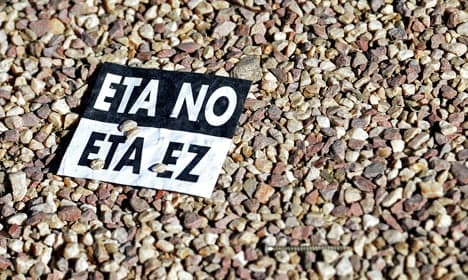Spanish court paroles former ETA head

A court in Spain on Friday paroled a former political head of the armed Basque separatist group ETA who had renounced violence and had already served three-quarters of a 30-year jail sentence.
José Luis Alvarez Santacristina, alias "Txelis", was detained in 1992 along with two other ETA leaders in Bidart in southwestern France in what was the first major operation on French soil against the group.
He strongly criticised ETA after the group in 1997 kidnapped and shot dead Miguel Angel Blanco, a 27-year-old town councillor from a working class neighbourhood in the Basque town of Eibar, and was expelled from the group for turning against the use of violence.
Judge Jose Luis Castro of the National Court, Spain's top criminal court, said in his ruling that Santacristina had "renounced violence in writing. He has recognised the harm he has caused and asked his victims for forgiveness."
"He has totally distanced himself from the terrorist organisation. He no longer follows any of its orders and criticises it whenever he has the chance," the judge added.
Santacristina was serving a 30-year prison term for organising the murder in 1992 of Manuel Broseta, a university professor and former Spanish senator.
France extradited Santacristina to Spain in 1999, seven years after his arrest.
For four decades ETA fought a bloody campaign for an independent Basque homeland in the area populated by Basque speakers in a corner of northern Spain and southwest France.
It is listed as a banned terrorist group by the European Union and has been held responsible for the deaths of 829 people during its on-off campaign of gun and bomb attacks on mainly Spanish targets.
Traditionally, ETA had used France as a rear-base for attacks on Spain, but the two European Union allies strengthened cross-border police cooperation and cracked down hard on the group, weakening it considerably.
In 2011, the group announced it had stopped its armed activities, but it has refused to hand over its weapons or dissolve the organisation, as demanded by governments in both countries.
It began a unilateral disarmament programme in early 2014, in cooperation with the International Verification Commission, an independent group of experts from various countries that has not been officially recognised by the Spanish government.
Comments
See Also
José Luis Alvarez Santacristina, alias "Txelis", was detained in 1992 along with two other ETA leaders in Bidart in southwestern France in what was the first major operation on French soil against the group.
He strongly criticised ETA after the group in 1997 kidnapped and shot dead Miguel Angel Blanco, a 27-year-old town councillor from a working class neighbourhood in the Basque town of Eibar, and was expelled from the group for turning against the use of violence.
Judge Jose Luis Castro of the National Court, Spain's top criminal court, said in his ruling that Santacristina had "renounced violence in writing. He has recognised the harm he has caused and asked his victims for forgiveness."
"He has totally distanced himself from the terrorist organisation. He no longer follows any of its orders and criticises it whenever he has the chance," the judge added.
Santacristina was serving a 30-year prison term for organising the murder in 1992 of Manuel Broseta, a university professor and former Spanish senator.
France extradited Santacristina to Spain in 1999, seven years after his arrest.
For four decades ETA fought a bloody campaign for an independent Basque homeland in the area populated by Basque speakers in a corner of northern Spain and southwest France.
It is listed as a banned terrorist group by the European Union and has been held responsible for the deaths of 829 people during its on-off campaign of gun and bomb attacks on mainly Spanish targets.
Traditionally, ETA had used France as a rear-base for attacks on Spain, but the two European Union allies strengthened cross-border police cooperation and cracked down hard on the group, weakening it considerably.
In 2011, the group announced it had stopped its armed activities, but it has refused to hand over its weapons or dissolve the organisation, as demanded by governments in both countries.
It began a unilateral disarmament programme in early 2014, in cooperation with the International Verification Commission, an independent group of experts from various countries that has not been officially recognised by the Spanish government.
Join the conversation in our comments section below. Share your own views and experience and if you have a question or suggestion for our journalists then email us at [email protected].
Please keep comments civil, constructive and on topic – and make sure to read our terms of use before getting involved.
Please log in here to leave a comment.